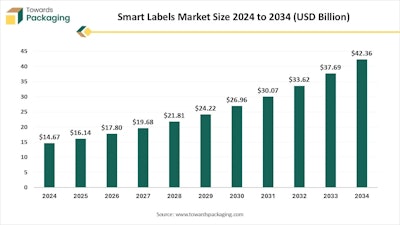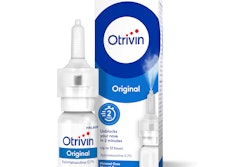Key takeaways:
· Industries across the board are increasingly relying on smart labels for inventory optimization & product tracking.
· Healthcare and pharmaceuticals represent the fastest-growing segment, driven by strict regulations requiring drug traceability and supply chain integrity.
· On the technology front, RFID remains the dominant solution due to its rapid, non-line-of-sight scanning capabilities, durability, and cost efficiency.
The global smart labels market is poised for significant growth, with projections indicating a rise from $14.67 billion in 2024 to $42.36 billion by 2034, representing a CAGR of 11.32% over the forecast period, according to Precedence Research. This surge is being fueled by technologies such as RFID, NFC, and QR codes, which enable real-time data retrieval, product authentication, and traceability. Industries across the board are increasingly relying on smart labels for inventory optimization, product tracking, and automation. Rising concerns over counterfeiting, combined with a global push toward smart, sustainable packaging, are further propelling demand. The integration of smart labels with IoT systems and continuous advancements in technology are also contributing to market momentum.
What are smart labels?
Smart labels are advanced labeling solutions that integrate technologies such as RFID (Radio Frequency Identification), NFC (Near Field Communication), QR codes, and sensors to provide dynamic, real-time information about a product or package. Unlike traditional labels, smart labels are interactive and can communicate data digitally, like package location, product temperature, authenticity, and provide automatic inventory updates.
By scanning a smart label with a smartphone or RFID reader, consumers can access product details, verify authenticity, or even interact with brand content. These labels support the broader movement toward digitization and smart packaging, where connected packaging solutions are reshaping how products are managed and experienced throughout their lifecycle.
Precedence Research reports that North America leads the market thanks to advanced technological infrastructure, early adoption of RFID, NFC, QR systems, and supportive regulations in industries such as pharmaceuticals and food labeling. Asia-Pacific is the fastest-growing region, driven by booming e-commerce, strong manufacturing bases, and government-backed initiatives in countries like China, India, Japan, and South Korea. Europe’s growth is supported by stringent traceability, food safety, and eco-packaging regulations, while adoption in the automotive and industrial sectors is also gaining pace. Latin America and the Middle East & Africa are witnessing steady growth, spurred by increasing e-commerce activity, digital transformation, and traceability needs in food and pharmaceuticals.
According to Precedence Research’s findings, there are seven emerging trends in the smart labels industry:
1. IoT, AI, and Blockchain Integration
2. Advanced Sensor Technologies and Battery‑Free Designs
3. Sustainability and Eco‑Material Adoption
4. Interactive Consumer Engagement Via NFC/QR/AR
5. Personalization and Variable Data Printing
6. Cost-Saving Innovations
7. Logistics and Compliance Mandates
On the technology front, RFID remains the dominant solution due to its rapid, non-line-of-sight scanning capabilities, durability, and cost efficiency. Sensing labels—capable of monitoring temperature, humidity, pressure, and safety—are gaining traction, particularly in pharmaceutical, food, and healthcare applications. Among label components, transceivers continue to play a central role in enabling wireless communication for real-time tracking and authentication, while microprocessors are emerging as the fastest-growing segment, offering enhanced functionalities such as tamper detection, on-label data processing, and smart interactions.
In terms of application, the retail and inventory management sector maintains its leading position, leveraging RFID for greater efficiency, shrinkage reduction, and operational speed. However, healthcare and pharmaceuticals represent the fastest-growing segment, driven by strict regulations requiring drug traceability and supply chain integrity. Overall, the smart labels market is set for strong, sustained growth as industries worldwide embrace connected, data-rich, and sustainable labeling solutions to meet the evolving demands of global commerce.
There are, of course, limitations and challenges in the smart labels market:
· Cost: Smart labels, especially those with RFID, NFC, or sensor technologies, are more expensive than traditional labels. Small and medium-sized enterprises (SMEs) often find it difficult to invest in these solutions due to high implementation costs, including hardware, software, and training.
· Lack of standards: There is also a lack of global standards for smart labeling technologies, which creates compatibility issues across supply chains and industries. This hampers smooth integration and scalability, particularly in international operations.
· Privacy concerns: As smart labels often collect and transmit data, there are growing concerns regarding data privacy and the risk of cyberattacks or unauthorized access. This is especially critical in the healthcare and personal care industries.
· Awareness: In many developing countries, awareness about the benefits and applications of smart labels is still low.
· Infrastructure: Infrastructure limitations, such as inadequate digital networks and poor supply chain digitization, further hinder adoption. Smart labels may not function effectively in extreme environmental conditions such as high humidity, electromagnetic interference, or fluctuating temperatures.























